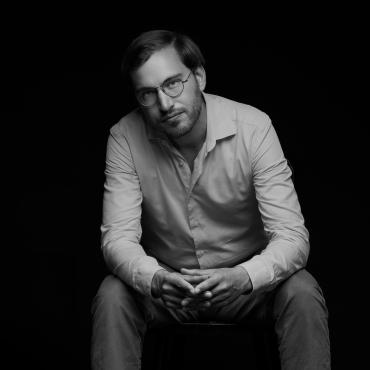Alexandre Casaccia
Alexandre Casaccia is an Italian concert composer whose music has been praised for its “finely layered textures,” “lyrical expressivity,” and “intellectually engaging craft.” A recipient of multiple awards, with three commissions secured in under a year and performances across Italy and the United States, his emergence is marked by both artistic clarity and momentum.
Raised in a musical family, Casaccia gave his first piano recital at the age of six and began composing during his teenage years. After completing his formal training as a pianist, he shifted his focus to composition, studying at the Milan Conservatory with Paolo Arcà and participating in masterclasses led by Alessandro Solbiati, Frédéric Durieux, and Anton Safronov.
He graduated with highest honors in 2025 from the “Luca Marenzio” State Conservatory in Brescia, where he studied under internationally renowned composers Paolo Ugoletti and Federico Biscione. His graduation thesis—examining the enduring influence of 18th-century ideals on contemporary chamber music—reflects his commitment to reexamine contemporary music’s relationship with the past.
Eclectic in both taste and output, Casaccia’s work ranges from electroacoustic compositions to traditional chamber and orchestral music, resisting easy categorization. His creative practice is grounded in the belief that song is an anthropological constant, and that pitch—especially in its linear unfolding—acts as the primary architect of musical form. In this spirit, his compositions seek to reawaken the expressive power of song within a contemporary sound world, bridging historical memory with experimental innovation in a process of mnemonic deformation.
Since 2024, his works have been performed by distinguished soloists of national and international acclaim—including Francesca Fantini, Carlo Prampolini, Claudio Sanna, Mario Scucces, Alessandro Zanotti, Daniele Del Deo, Angelo Cavallo, and Alessio Brontesi—and conducted by Leonardo Perico and Federico Biscione.
Beyond his compositional work, Casaccia is active in education and research. He holds a degree in international relations and history from the London School of Economics (LSE), and has lectured widely across Europe on the intersection of contemporary music and cultural history. He is the author of From Palestrina to Bach: A Treatise on Counterpoint (2023), as well as numerous scholarly articles on music theory, history, and aesthetics.
In an era when music is often fragmented and self-referential, Alexandre Casaccia offers a voice “both earnest and structurally refined”, “intellectually rigorous yet emotionally generous”. His music reminds us that even amid noise and acceleration, there remains space to listen closely—to ourselves, to our histories, and to the quiet, mysterious power of sound.
